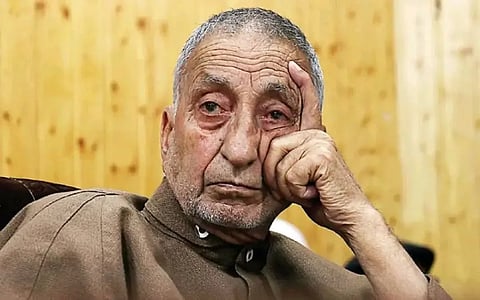

SRINAGAR: Jammu and Kashmir, where political landscape is always full of consternations, the death of Professor Abdul Gani Bhat, an academic and a Hurriyat leader, who was once the chairman of the All Parties Hurriyat Conference (APHC), leaves a silence where a moderate voice once resonated.
His passing away, at the age of 90 after a brief illness at his ancestral home in Sopore’s Botingoo village, marks the end of an era for those who championed the cause of dialogue amid one of the world’s most intractable conflicts.
Bhat was born in the small north Kashmir village of Botengo, 10 kilometres from Sopore. His father was illiterate, but “worldly wise and a village headman.” After leaving school he joined the Government Degree College, Sopore, an institution where years later his future would take a new turn.
Bhat, a professor of Persian and a law graduate whose intellectual grace belied the turbulence of his homeland, was a study in contradiction. He was a pacifist pro-resistance political figure, who sat with Indian prime ministers, a moderate whose faction was banned by New Delhi, and a pragmatist who never relinquished his dream for a peaceful resolution of Kashmir.
Educated in Persian and law at Aligarh Muslim University, he began as a lawyer and academic before co-founding the Muslim United Front (MUF) on July 13, 1986, a coalition that contested elections and fragmented after allegations of rigging and force by the government agencies.
A fine orator, Bhat remained active in politics until his final years, always speaking in long, thoughtful sentences like the professor he once was.
Bhat was widely seen as an honest and a simple man. His only problem, according to his detractors, is that he is not a politician – he tends to speak his mind rather than take refuge in diplomatic euphemisms.
He talked of civilisational identity and believed religious bonds are stronger than ethnic character. Partition of India, for him, was the outcome of a clash of civilisations. He said that Kashmiri Hindus and Sikhs never supported Kashmir’s struggle – a glaring example of how strongly religion binds people.
Bhat headed the Jammu and Kashmir Muslim Conference, a party with a constitutional stand that the state should accede to Pakistan. In fact, Bhat’s party pioneered the resistance movement in Kashmir against Dogra autocratic rule, before the National Conference was carved out of it in 1938.
Peace-Making Role & Controversies
As APHC Chairman, Bhat was a bold votary of diplomacy and dialogue. In a 2003 interview, he insisted the Kashmir dispute was “not to be linked by any stretch of imagination either to territory or to ethnicity or to religion,” but it must be rooted in the “political rights of the people to exercise their choice”.
He met Indian leaders, including Atal Bihari Vajpayee and L.K. Advani, arguing that India-Pakistan dialogue was the only path to peace, even as he maintained Kashmiris must be “the final arbitrators of our fate”.
Yet his moderation often alienated some of the leaders in the two factions of APHC. In 2017, his engagement with New Delhi’s interlocutor, Dineshwar Sharma, sparked internal strife within the APHC, leading to a great confusion in the rank and file of the two factions of Hurriyat Conference.
Earlier last year, India banned his faction under "anti-terror laws", accusing it of “generating feelings of hatred” and having “linkages with banned militant organisations”. To supporters, this misreads a man who consistently condemned violence and sought common ground.
His son, who took on the mantle from him during his lifetime, is the main driving force at the Hurriyat office.
A Void
His death comes at a time when the space for pacifist resistance has shrunk to a whisper. Since the abrogation of Article 370 in 2019, which stripped Jammu and Kashmir of its autonomy, the region is currently facing economic distress, and pervasive ecological issues.
The APHC’s calls for dialogue, reiterated recently by Bhat’s colleague, Mirwaiz Umar Farooq, have been met with uneasy silence.
On both sides of the Line of Control, Bhat’s passing is felt as a loss. By some people in India, he was seen as a potential bridge who could be reasoned with. In Pakistan, he was respected as one of the important voices for the Kashmiris.
But among Kashmiris, his absence underscores a deeper loss of the fading hope that politics, not violence, might one day bring deliverance.
Bhat’s vision of a Kashmir resolved through dialogue, not force, now feels distant. His death leaves a void not easily filled, a reminder that the moderate centre is crumbling. If this happens, then it is unfortunate.
Bhat’s Interesting Legacy in Brief:
· Dismissed from teaching in February1986 for "constituting a threat to the security of the state," Bhat turned to politics, co-founding the MUF and later leading the APHC.
· The 1987 Turning Point: The MUF’s defeat in allegedly rigged elections according to some became a catalyst for militancy—an outcome Bhat called "violence breeding violence".
· Personal Tragedy: His brother was killed by militants, yet Bhat forgave them "in the larger interest".
· Banned but Unbowed: His faction, Muslim Conference (MCJK), was banned in February 2024, reflecting New Delhi’s hardening stance against even moderates.
(This news article has been updated with some corrections in the text.)
Have you liked the news article?